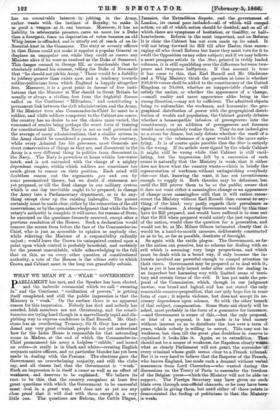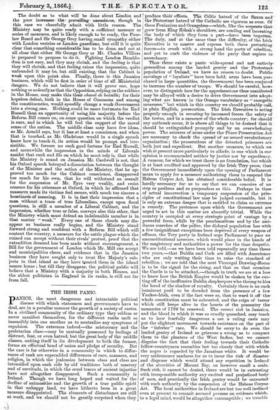WITAT' WE - MEAN BY A " WEAK " GOVERNMENT.
DARTAAMENT has mete and the Speaker has been elected, and the imbecile ceremonial which we call-" swearing in" and the Continent "verification of powers," is getting itself completed, and still the public impression is that the Ministry is "weak." On the surface there is no apparent reason for-this-impression. Nobody has died and nobody has seceded, Irish members are not threatening, and the consti- tuencies are trying hard though in a marvellously tepid and dis- piriting way to express confidence in Earl Russell. Mr. Glad- stone has an overflowing Treasury, Sir G. Grey has not par- doned any- very great criminal, people do not yet understand how far the India House is responsible for that astounding scene in Madras, at the end of which the Commander-in- (lief pronounced his army a helpless "rabble," and issued an order—it really is- in black and white—creating English serjeants native officers, and no particular blunder has yet been made in dealing with the Yenians.. The elections gave the Government an overwhelming majority; and still the clubs say, and all classes feel, that the Government is "weak" Such- an impression is in itself a cause as Well as an effect of weakness,. and deserves-. to be explained. We believe its- root to be. this, that the country recognizes at least five great pestions with which the Government to be successful must deal in a great way, and does not as yet see any clear proof that it will deal with them except in a very little one. Tho, questions are Reform, the Cattle Plague, Jamaica, the Extradition dispute, and the government of London,. its casual poor included—all of which will compel action; on all of which action should be decided, and on all of which-there are symptoms of hesitation, or timiaity, or half e heartedness. Reform is the most important, and on Reform. it is clear the Cabinet has not even made up its mind. It will not bring: forward its Bill till after Easter, thus encou-. raging all who dread Reform but knowthey must vote for it to. swell the Opposition many other subject; and if we may believe- s most pompous article in the Star, printed in trebly leaded columns, it is-still squabbling over the difference between two-- pence and twopence halfpenny. If that account is- true' it has come to this, that Earl Russell and Mr. Gladstone- and a Whig Ministry think the question at issue- is whether 200,000 voters shall be added to the constituency -of the United Kingdom or 70,000, whether an inappreciable change will satisfy, the nation,, or whether the appearance of a change, —small reality and mere appearance alike being in the- wrong direction,—may not be sufficient. The admitted objects. being to enfranchise the workmen, and harmonize the. geo- graphical distribution - of power with the geographical clistri-- bution of wealth and population; the Cabinet gravely debates,. whether a homoeopathic infusion of greengrocers into the, constituency, or an addition of greengrocers and foremen: would most completely realize them. They de not indeed give- us a. stone for dinner, but only debate. whether: the smell of .a. herring or the substance of a sprat would be the more satise- fyinge It is of course quite possible that the Star is-entirely. in the wrong. If its article were signed by the whole Cabinet it might still be wrong while that Cabinet is still vacil- lating, but the impression , left by a succession of stick errors is naturally-that the Ministry, is weak, that it either does not know -what the country wants—which is briefly the'- representation of workmen. without extinguishing everybody- else—or that, knowing the want, it has not inventiveness- enough to supply it. Both theories- may be delusions, but. until the Bill proves them to be so the public, aware that it-does not want either a meaningless chancre or an appearance, of change more meaningless still, that. it °will rather recon- struct the Ministry without Earl Russell than consent to any-- thing of the kind, very. jostly regards their prevalence- as-- signs of weakness.. A strong Government would by this time - have its Bill prepared, and .would have suffered it to ooze out that the Bill when prepared would satisfy the just expectation of the nation, would close the question for a generation, and would not be, as Mr. Milner Gibson intimated clearly that it- would be, a hand-to-mouth measure, deliberately constructed so as to be, as far as possible, destitute of foresight.
So again with the cattle plague. The Government, soefar as the nation can perceive, has no scheme for dealing with an evil which is assuming very large proportions, and which- must be dealt with in a broad way, if only because the in4 terests involved are powerful enough to compel attention to. their views. Government may be prepared so to deal with it, but as yet it has-only issued order after order for dealing in - an imperfect but harassing way with limited areas of terrie tory and certain forms of the evil. It has put aside the pro.- posal of the Commission, which, though in our judgment' unwise, was broad and logical, and has not stated the only reasonable counter-proposition, that our only hope lies in some- form of cure ; it rejects violenee, but does-not accept its ne- cessary dependence upon science. So with the other branch. of that subject, compensation. Some State aid clearly will be- asked, most probably in the form of a guarantee for insurance, —and Government is aware of this,—but the only proposal, or hint of a proposal, it has made is to lend money without interest so as to distribute the loss over a term of years, which nobody is willing to accept. This may not be- weakness, but then till the great plan doubtless in reserve is explained it looks like it. Again, as, to extradition. That- should not be a source of weakness, for Napoleon clearly woke what as clearly Parliament will not grant, the surrender of every criminal whose guilt seems clear to a French tribunal. But it is very hard to believe that the Emperor of the French, who knows England, has made such a demand without verbal assurances from Lord Clarendon—who wanted daring the discussions on the Treaty of Paris to surrender the. freedom of the Belgian press—which the.Minist7 will not be able to support. The Foreign Secretary may have given no such hints even through non-official channels, or he may have been- quite right in giving them, but until either of those points is demonstrated the feeling of politicians is that the Ministry is weak. The doubt as to what will be done about London and 1 the poor increases- tins? prevairing uneasiness, though in this case we cheerfully admit with little reason. The Ministry may be qnite ready with a sufficient measure or series of measures, and is likely enough to be ready, the Poor- law Board and Sir George Grey having small sympathy either with London vestries or London guardians, but still it is quite clear that something considerable has to be done) and not at all clear that either Sir George Grey or Mr. Charles Villiers is prepared to propose- to do it. Fighting London Bumble- dom is not easy, and they may shrink, and the. feeling is that they will shrinki. and that feeling raises the impression, quite unfounded it may be; but still existing,- that the Cabinet is weak upon this pint, also Finally, there is this Jamaica business, which-win be first in order of time of all Ministerial dangers.. We -do not believe that it will prove' one, hope nothing so ardentlyaa that the Opposition, relying on the soldiers in 'the House, may, make this their cheval de bataille; for their hopeless defeat, both in the. House of Commons and among the constituencies, wouLI:speedily change a weak Government into a strong pne. Nothing could be. more fortunate for Earl Russell than an opportunity of using his majority before the Reform Bill comes on, on some piestion on which the verdict is-sure, and in which he will" feel the support.of the. moral sense of the. nation. The middle class may have few ideas) as Mr. Arnold says, but it has-at least a conscience) and when that is touched, as Mr. Gladstone would. in a single speech know how to touch it, its action would be prompt, and irre- sistible. We foresee no such good fortune for Earl Russell, and meanwhile the impression in the minds of Liberals amidst that rank and file on which he. must-rely is, that while the Ministry is sound. on Jamaica Mr. Cardwell is not, that his Oxford speech betrayed a dissociationhetween the thought of the Minister and the action of the Ministry, that he ap- proved too muchr for the Cabinet conscience, disapproved too much for his- own, that he will withstand an assault for the suspension of Mr. Eyre very weakly, and resist censure for his utterance at Oxford, in which he affirmed that massacre made its victims feel secure, with much too sincere a heartineds-of meaning. It is in fact their impression that a man without a trace of true Liberalism, except upon fiscal questions, is still a member of a Liberal Cabinet, and the impression., whether true. or false, conveys also this other, that the Ministry which must defend an indefensible member is in that matter "weak." Every one of these clouds may dis- appear as business really begins, and the Ministry- stand forward strong and confident with a Reform Bill which will content the country, a measure for the cattle plague which the ruined can accept without their rivals' protest, proof that the extradition demand has been made without encouragement, a Bill for the government of London which Mr Mill can accept and municipalities cheer, and evidence that in the Jamaica business they have sought only to treat- Her Majesty's sub- jects in that island as they have treated them in the island nearer. home ; but till they disappear; the political. public will believe that a Ministry with a majority in both Houses, and the ablest politician in England in its ranks, is still not far from. fall.































 Previous page
Previous page